Watt Read online
SAMUEL BECKETT
Watt
Edited by C. J. Ackerley
Contents
Title Page
Preface
Table of Dates
From the Watt notebooks
Watt
I
II
III
IV
Addenda
About the Author
About the Editor
Titles in the Samuel Beckett series
Copyright
Preface
Watt is a curiosity. As Beckett insisted to George Reavey in 1947, when he was vainly seeking a publisher: ‘It is an unsatisfactory book, written in dribs and drabs, but it has its part in the series, as will perhaps appear in time.’ Few would now dispute the latter claim, at least: Watt complements the earlier Murphy and the later Three Novels with its comic attack upon Cartesian rationality, and its protagonist takes his awkward stance among Beckett’s shabby moribunds, whose inability to adapt to the contingencies of the world finds its ultimate accommodation in the asylum, but whose plight invokes what Beckett (following Schopenhauer) deemed the only possible ethical value, that of pity.
Watt is ‘unsatisfactory’, however, and in obvious ways. Thus its peculiar pedantry and its monstrous paradigms of mounting complexity, which must daunt even the most enterprising reader. And designedly so. The text assumes a fundamental condition of human fallibility and error, and it therefore includes intentional mistakes, with which to probe the soft centres of the rationalist enterprise. Further, it embodies Beckett’s aesthetic of failure: Watt’s endeavour to bear witness, to comprehend the essence of his master, Mr Knott, by means of his accidentals (a parody of both Scholasticism and the Cartesian méthode), leads not to a knowing but to a philosophical impasse, a consequent breakdown and finally to madness. But Watt is also, incongruously, the most lovable of all Beckett’s texts, once the reader learns to respond (as Watt to Mrs Gorman) to its curious charms.
The more distressing, then, that for the first six decades of its existence (as manuscript and book) the text of Watt has been a mess. The problem of error is crucial, for as Watt interrogates the foundations of rational inquiry, the distinctions between intended errors, authorial errors, mistakes introduced by publishers, changes of intention and other obnubilations loom all the larger. If no distinction can be drawn between deliberate and inadvertent error then all interpretation is fraught. To an extent, this will always be so with Watt, because its textual history is so complex; but a first scholarly step must be the determination of the best text possible (if not the best possible text).
Watt began, and ended, in Paris: the first entries in what would prove to be six notebooks dated ‘11 February 1941’, and the last signed off with ‘Dec 28th 1944 / End’. Much of the writing was done while Beckett was on the run from the Gestapo between 1943 and 1945, in the small town of Roussillon, in the Vaucluse, where he and his partner, Suzanne, had taken refuge. The novel was written in English, he told Reavey, ‘first on the run, then of an evening after the clod-hopping’. He later described it to Lawrence Harvey as ‘only a game, a means of staying sane’; and he dismissed it to Ruby Cohn as ‘an exercise’, written to counter the long hours of ennui as he waited for nothing to happen.
Yet Watt is a very Irish novel, its world of trams, trains and verdurous ditches recognisably that of Beckett’s childhood. Mr Knott’s house is based on Cooldrinagh, the Beckett family home; Watt’s journey can be traced from Harcourt Street Station and past the Leopardstown racecourse to the small south Dublin station of Foxrock; and many of the characters have their originals in that world. Watt was written, Beckett told Gottfried Büttner in 1978, ‘as it came, without pre-established plan’. This is at best a partial truth. Beckett clearly had no sense at the outset of where the novel might end, and to that extent its only unity, like that of Dream of Fair to Middling Women, is an involuntary one; on the other hand the process of writing and rewriting took several years, as the present imago slowly emerged from the chrysalis of literally hundreds of pages of early drafts, the fragmented structure of the whole not altogether reflecting the love and care lavished on so many of its parts.
In addition to the six notebooks, there are two early typescripts and miscellaneous loose leaves. The relationship between these is not neat and tidy, with Beckett often typing up materials as he was working on other sequences, and frequently returning to past drafts to write over them and to add further details. He tended initially to write on the rectos only, leaving the opposite versos for afterthoughts, doodles, outlines of complex paradigms and later rewritings of selected passages.
A broad distinction can be discerned between the ‘early’ and ‘later’ drafts: fragments of the former preserved in occasional flickers and details of the published text, but more obviously in the materials of the thirty-seven ‘Addenda’ (so called), which, like fossils among the rocks, testify to what the novel once was and what it might have been. The ‘early’ stages of what would become Watt are not easily outlined, for the evolution of the text is intricate and by no means neatly punctuated. As The Unnamable would do, the ur-Watt began by invoking the scholastic memoria technica: ‘who, what, where, by what means, why, in what way, when’, by which any subject traditionally might be broken into its parts for analysis, or patterns extended infinitely. This was followed by the image of an old man, perhaps Socrates, whose place in time and space would be defined by the application of scholastic categories, which in turn would generate not only Watt but the Beckett protagonist of the next forty years: ‘X is a man, 70 years old, ignorant, alone, at evening, in his room, in bed, having pains, listening, remembering.’ From this arose a figure, finally named ‘Quin’, whose extension into space and time required a family, a house, a garden and servants, one of whom was named ‘Arsene’. Then he needed (as witness?) a narrator, gradually (over many drafts and rewritings) defined as ‘Johnny’ Watt, the point being that the early ‘Quin’ was the prototype or common ancestor of both Watt and Knott. The presence of ‘Quin’ rather than ‘Knott’ is (very crudely) an index of ‘early’ rather than ‘later’ composition; but though countless small details from this stage would leave their mark upon the published text, the broad outline of the novel at this point is barely recognisable.
The ‘later’ drafts (parts of Notebook 4, Notebook 5 and Notebook 6) more obviously resemble the final text: rewriting many sections of the novel (the opening of Part I, the asylum scenes of Part III), substantially revising other scenes (Parts II and III) and composing Part IV (Notebook 6) in virtually its final form. The ‘plot’ of the novel, Watt’s frustrated quest (his coming and his going) to understand his master (who abides), was at last defined. After the war, in Dublin and Paris, Beckett shaped the final sequences of the text and typed out a fair copy, alas now lost. It is possible that this typescript, presumably used as the printer’s copy, or its carbon, might yet turn up, but its absence has required those seeking to determine the evolution of the text to work on broad philological grounds, on the one hand from the late drafts and notebooks, and on the other from the galley proofs (now located at Washington University, St Louis, with a copy at the Beckett International Foundation in Reading), to ascertain its likely form. Enough material exists to render this a feasible project, but nevertheless one critical stage of the text no longer exists.
This is of some importance as, one could argue, the ‘best’ text for a definitive edition of a novel like Watt might be a virtual construct, an ideal object, somewhere between the author’s final intentions as realised on his fair copy and the first published edition. In this instance, the fair copy does not exist and the first published edition emerged in 1953 from the Olympia Press, purveyors of pornography whose attention to detail was less than scrupulous (though it mus
t be acknowledged that Beckett’s own proof-reading was less than adequate, and also a source of many persistent errors). Like Vladimir Nabokov, whose Lolita was also published by Olympia, Beckett found himself in a quagmire from which he could extract himself, and the text of Watt, only with considerable difficulty.
How did this come to pass? After the war, Beckett had tried to find a publisher for his new novel. The typescript was placed with different agencies (Curtis Brown, A. P. Watt and Son) and sent to numerous houses, but publishers were emphatic in their rejections, their readers’ reports ranging from hostility to bafflement. One reader (Herbert Read) found it ‘too wild and unintelligible’ for post-war production, given the limited supply of paper; another (Harold Raymond, for Chatto and Windus) felt that it was modelled on Joyce ‘at his more obscure and bestial moments’; and yet another (Frederick Warburg), acknowledging that he might be turning down another James Joyce, wondered: ‘What is it that this Dublin air does to these writers?’ Watt was thus set aside as Beckett in 1947 began the ‘frenzy of writing’ in French that would produce in a short time Quatre nouvelles, Mercier et Camier, Molloy, Malone meurt, L’Innommable and En attendant Godot.
However, four pre-publication extracts, each differing slightly from the later text, appeared between 1950 and 1953 in various small magazines, in Ireland and France, the most important of these being that in Merlin 1:3 (Winter 1952–3), with a note saying that an ‘unexpurgated version’ of the whole would appear in later spring from the Collection Merlin. This was a small group of expatriates, led by Richard Seaver, Alexander Trocchi and Alice Jane Lougee, which included Christopher Logue and Austryn Wainhouse, whose Olympia connections were to prove fateful, as well as Patrick Bowles, with whom Beckett would later work on the translation of Molloy into English. Enchanted by what they had read, this group resolved to publish the whole; but this they could not do under French law without a French publishing house acting as a gérant, or manager. Maurice Girodias of Olympia Press agreed to be the associate, and if this was not in Beckett’s eyes an ideal resolution he could at least express relief that his ‘old misery’, Watt, was about to come out at last, as it did on 31 August 1953.
The novel appeared in a special edition of 25 signed copies on deluxe paper, and an ordinary edition of 1,100 numbered copies. The magenta cover of the latter, with its lurid frame of asterisks, horrified Beckett, who complained to Barney Rosset of Grove Press about the misspellings, inverted letters and the typeface ‘so scrubby and ugly’. His only consolation, perhaps, was that Joyce’s Ulysses had suffered similar indignities, and survived (and, like Ulysses, Watt was immediately banned in Ireland). Beckett obviously hoped that this publication would be but a first step, like that of Krapp, to ‘getting known’; but Girodias caused trouble when Beckett entered into negotiations with Rosset with respect to an American edition, which effectively delayed that publication until 1959.
The Olympia Press Watt, for all that it is technically the first authorially approved edition, is not suitable as a template for a scholarly edition, as this new Faber text promises to be. The Olympia plates (after the dispute was resolved) were, however, used to photo-offset the first Grove Press edition, so that the Grove may reasonably be said to be, in effect, a first publication, but a much better one, with most of the more blatant errors corrected. However, the cost of resetting the plates, as well as the casualness, meant that this American first edition perpetuated a large number of mistakes, some of which had been pointed out by Beckett (who had marked up his Olympia copy for Grove); others had simply not been noticed, or, if noticed, ignored. Some corrections were made silently in later Grove reprints, though these were nowhere acknowledged as a new edition.
The Grove first edition, despite its many and persistent errors, is the most suitable text to act as a template for a scholarly edition, and this despite one significant excision (pp. 45–6 of the Olympia original) of a poem about an Indian Runner duck, Arsene’s pet, together with Arsene’s eulogy of its virtues. The excision of this passage, by luck or good management almost exactly one page long, led to a curious gap in the text of one line in all Grove editions (until the 2006 Centenary Edition), followed by an indentation of a further half-line (the cost of resetting the type presumably prohibitive), and thereafter a discrepancy of one page between the Olympia and Grove editions until the end of Part I, when an extra blank page in the Grove restored the text in statu quo (as Nelly might say). The excision caused a further problem, in Part II, when Watt thinks of Arsene and wonders what has become of the duck. ‘What duck?’, the reader might wonder. Beckett wanted Grove to tidy up the anomaly, but re-setting the type was (presumably) too awkward, and so the later reference to the duck remained until dispatched in the Calder and Grove Centenary editions. I have decided to retain the oddity, on the grounds that (i) Grove did not change the text, despite ample opportunity, (ii) it is not an ‘error’ in the usual sense of that word, and (iii) the lack of any textual referent is duplicated in Part IV by the grousebags, of which mention has not previously been made (despite what the text says to the contrary), and Watt’s vomit, which is mentioned only en passant.
Having elected to use the Grove text as my essential point of reference, I have adopted a conservative editorial policy, making detailed reference to the manuscripts and pre-publications to resolve small cruxes, while acknowledging the principle that Beckett himself affirmed when writing to John Fletcher (21 November 1964) while preparing the French translation: ‘No alteration in reprints, except spelling mistakes.’ One huge difficulty, however, is that despite this affirmation Beckett’s own practice was much more cavalier. When in 1963 John Calder prepared to publish the first British edition (copies of the Grove and the Olympia had been available in the United Kingdom, Calder having acted as agent for both), Beckett had taken the opportunity to mark up his personal copy of the Grove first edition to assist in the process. The outcome was not good.
Admittedly, the 1963 Calder Jupiter edition of Watt is in some respects an improvement on previous editions, as many mistakes that had persisted into the Grove were caught and corrected. But others remained uncorrected, Beckett (or Calder) obviously not having noticed them. Worse, some of the changes that Beckett recommended, most of which Calder adopted, were clearly changes of intention rather than correction of obvious errors (though, admittedly, the line between these categories is blurred). In his early essay, Proust, Beckett had argued that the uncle who eats his dinner today is not the same uncle who ate his dinner yesterday; in like manner, the Beckett of 1963 was not the Beckett who had written Watt a decade and more earlier. Moreover, the Calder Watt, which remained unchanged since 1963 and formed the basis for the Picador paperback edition as well as several translations, is unreliable, Calder having used his own initiative on matters of setting, spelling and punctuation, with the consequence that quite literally dozens of new errors (to say nothing of dubious hyphens and commas) were introduced.
The new Faber edition incorporates changes and recommendations made up to and including the first American publication, but adopts thereafter the conservative principle of not making further changes unless there is obvious error. The major problem here is to distinguish between ‘obvious error’ and changes of ‘authorial intention’; while many errors in the Grove text should be emended, there are also instances in which the manuscript and pre-publication evidence indicate that Beckett had later changed his mind. Three examples may illustrate the problem:
(a) The poem in the Addenda, which begins ‘Watt will not / abate one jot’, ends ‘Watt will not / abate one tot’. This looks like a clear error (like ‘yellowist’ at the end of Part II), but the notebooks and galley proofs indicate unambiguously that the final ‘tot’ was present from the poem’s inception. There is thus no reason to emend to ‘jot’, despite Beckett’s later instruction to Calder to do so. Beckett was fond of the pun, with its summation of death (German tot, ‘dead’), and fond of accountancy; compare ‘make the tot’ in Malone Dies. My
decision here is to retain the apparent ‘error’.
(b) The second verse of the song in Part I (page 28) illustrates a similar principle, but leads to a different resolution: all the drafts read ‘Fifty-two point one’, but the galleys have instead ‘Fifty-one point one’. Perhaps Beckett made the change on the missing final typescript, but since ‘Fifty-two point one’ intimates the number of days in an ordinary year (as opposed to the leap year of the first verse), the manuscript evidence strongly suggests an error. My choice therefore is to emend.
(c) At the outset of the novel, when Mrs Nixon comments on what Watt had on his head she employs (in all editions) the word ‘accoutrement’. However, I have sanctioned the change to ‘accowterment’ (which accentuates the pretension), on the basis of a like spelling on the galley proofs (not remarked by Beckett), and as supported by the authority of Beckett’s letter to editor John Ryan (15 December 1949), in which he said of the extract to be published in Envoy 1.2 (January 1950): ‘Accowterment is intentionally misspelt.’ The French typesetters seem to have ‘corrected’ this (to the usual French form), but while the case is not completely persuasive there seems to me sufficient evidence to justify restoring the anomaly.
There are many such decisions to make; each has to be weighed on its individual merits, and the choice is not always clear-cut. For instance, the first of the major paradigms in Part I (sang, cried, stated, murmured) would appear to exhaust the possible combinations, but one variation (‘sang and stated and murmured’) is omitted, an omission also present (or absent) in the notebook and galleys. The paradigm is analogous to the seven scarves at the outset of Murphy, only six of which are enumerated, this being a challenge to the rationalist assumption implicit in the naming of parts. Yet later in Watt, in the description of the Lynch family, the three uncles {Joe, Bill, Jim} ring out the changes; but the sixth variation {Bill, Joe, Jim} is identical to the third; as this seems to be an error rather than a ‘teaser’, I have made the change to {Bill, Jim, Joe}, thus rendering the pattern complete. In like manner, in Part III, as Sam tries to interpret Watt’s broken speech by various repetitive structures, the pattern {presume, suppose, presume} appears, when logic supports the reading {suspect, suppose, presume}, which completes the pattern. Again, I have made the change, despite the lack of any explicit warrant (the errors, as I call them, persisting in all previous editions). Such changes have been warranted only when the weight of evidence suggests that it would be more incorrect (for there is often no ‘right’ answer) not to do so.

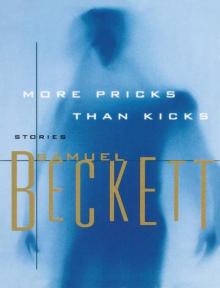 More Pricks Than Kicks
More Pricks Than Kicks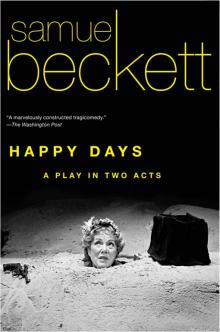 Happy Days
Happy Days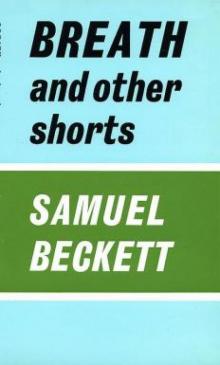 Breath, and Other Shorts
Breath, and Other Shorts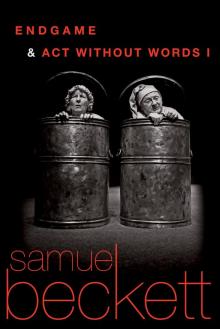 Endgame & Act Without Words
Endgame & Act Without Words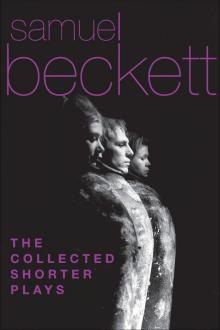 The Collected Shorter Plays of Samuel Beckett
The Collected Shorter Plays of Samuel Beckett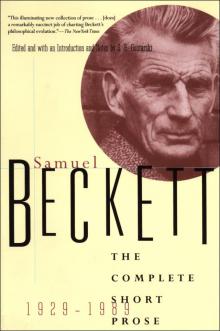 The Complete Short Prose, 1929-1989
The Complete Short Prose, 1929-1989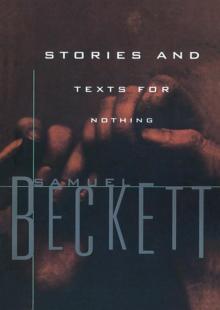 Stories and Texts for Nothing
Stories and Texts for Nothing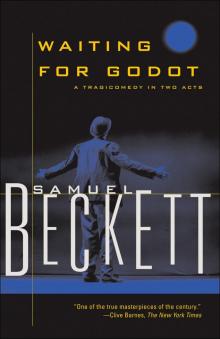 Waiting for Godot
Waiting for Godot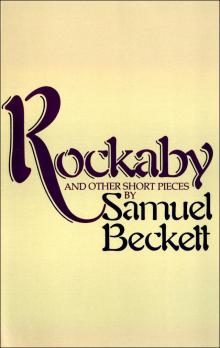 Rockaby and Other Short Pieces
Rockaby and Other Short Pieces First Love and Other Shorts
First Love and Other Shorts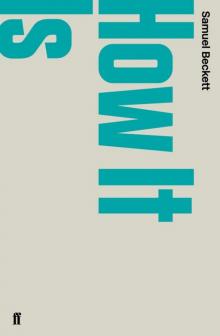 How It Is
How It Is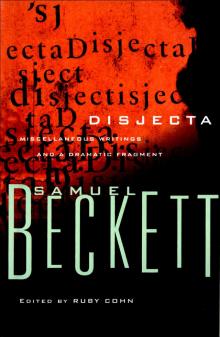 Disjecta: Miscellaneous Writings and a Dramatic Fragment
Disjecta: Miscellaneous Writings and a Dramatic Fragment Echo's Bones
Echo's Bones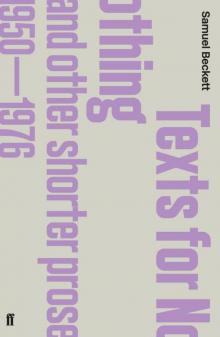 Texts for Nothing and Other Shorter Prose 1950-1976
Texts for Nothing and Other Shorter Prose 1950-1976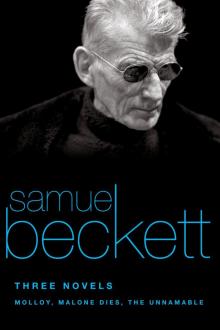 Three Novels
Three Novels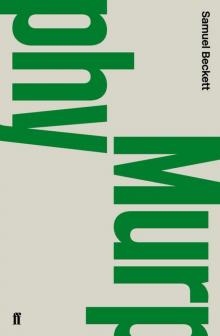 Murphy
Murphy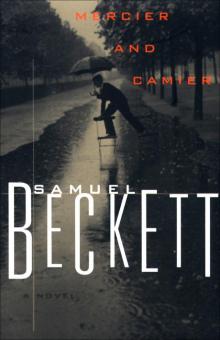 Mercier and Camier
Mercier and Camier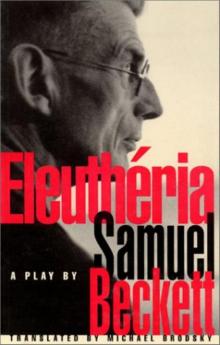 Eleuthéria
Eleuthéria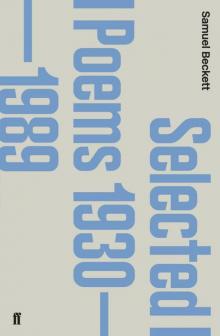 Selected Poems 1930-1988
Selected Poems 1930-1988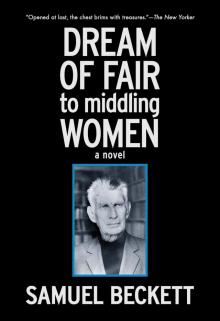 Dream of Fair to Middling Women
Dream of Fair to Middling Women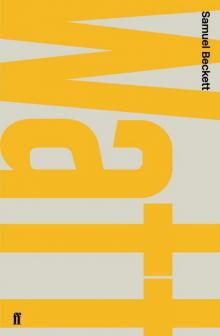 Watt
Watt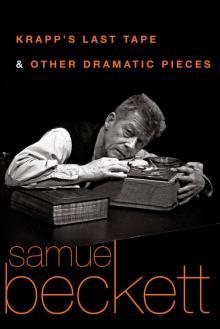 Krapp's Last Tape and Other Dramatic Pieces
Krapp's Last Tape and Other Dramatic Pieces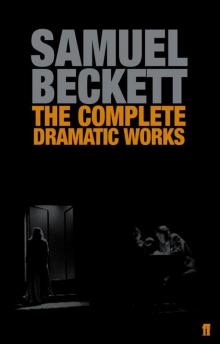 The Complete Dramatic Works of Samuel Beckett
The Complete Dramatic Works of Samuel Beckett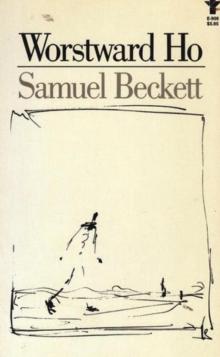 Worstward Ho
Worstward Ho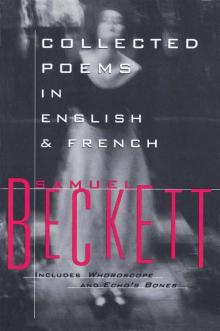 Collected Poems in English and French
Collected Poems in English and French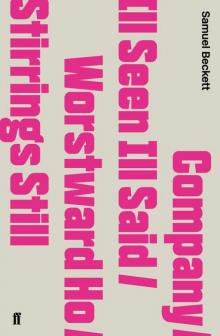 Company / Ill Seen Ill Said / Worstward Ho / Stirrings Still
Company / Ill Seen Ill Said / Worstward Ho / Stirrings Still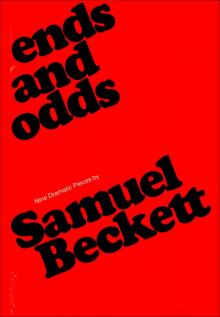 Ends and Odds
Ends and Odds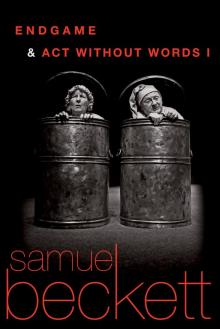 Endgame Act Without Words I
Endgame Act Without Words I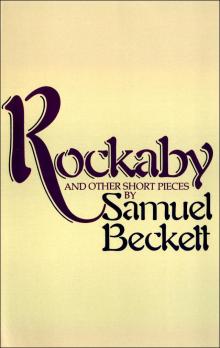 Rockabye and Other Short Pieces
Rockabye and Other Short Pieces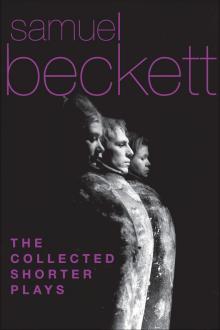 The Collected Shorter Plays
The Collected Shorter Plays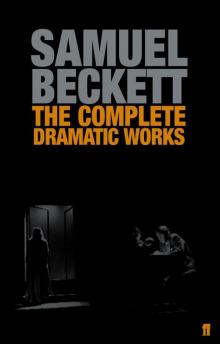 The Complete Dramatic Works
The Complete Dramatic Works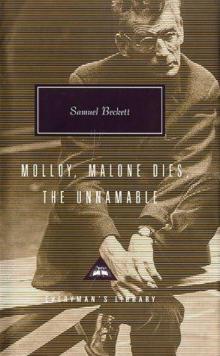 Three Novels: Malloy, Malone Dies, The Unnamable
Three Novels: Malloy, Malone Dies, The Unnamable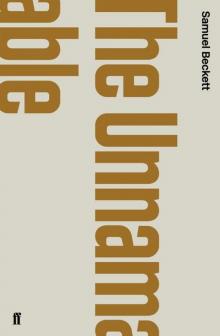 The Unnamable
The Unnamable